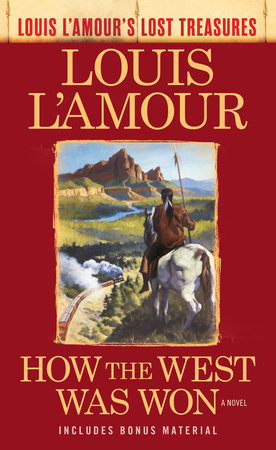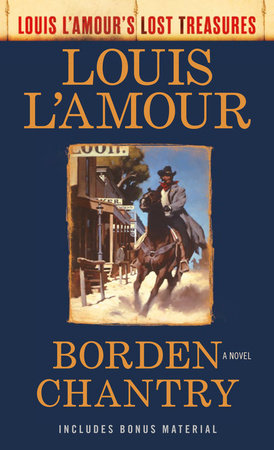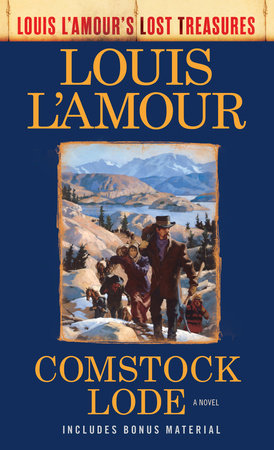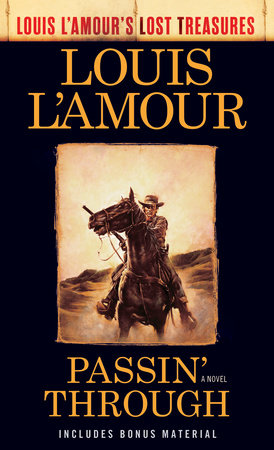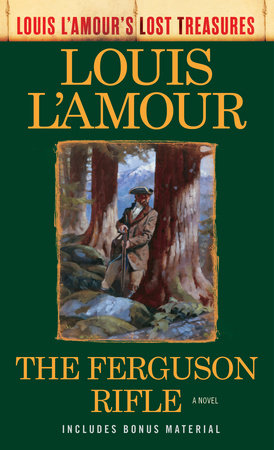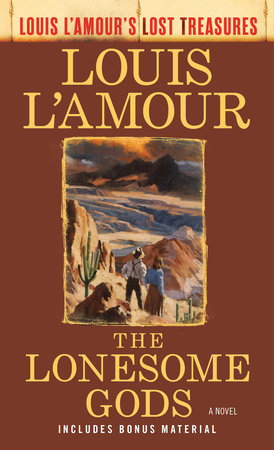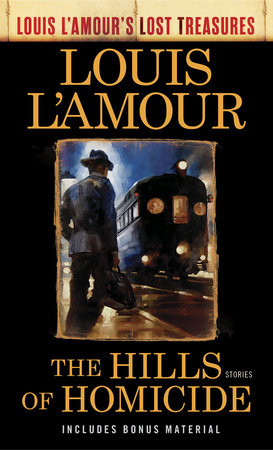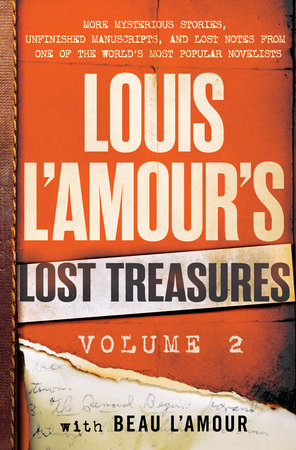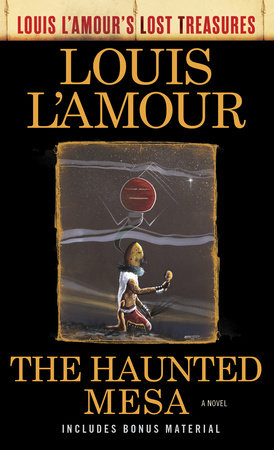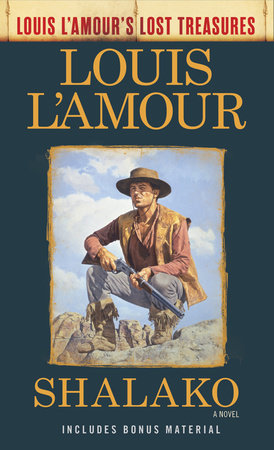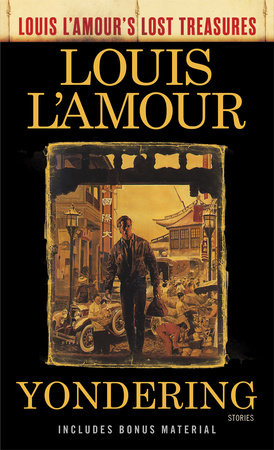Excerpt
How the West Was Won (Louis L'Amour's Lost Treasures)
9780425286098|excerpt
L'Amour / HOW THE WEST WAS WON
CHAPTER 1
THE SUN WAS not an hour high when Linus Rawlings came upon the trail of the Ute war party. The high walls of the narrowing valley of the Rio Grande barred all escape, and Linus knew he was in trouble.
A man of infinite patience, he was patient now, sitting his line-backed buckskin in the dappling shadow of the aspens. Behind him trailed three packhorses carrying his winter’s catch of furs, while before him the mountain slope lay bright with the first shy green of spring.
Nothing moved along that slope, nor in the valley below . . . only the trembling leaves of the aspen. Linus, never one to accept the appearance of things in Indian country, remained where he was.
Against the background of the aspens he was invisible as long as he remained still, for his clothing, the horses, and their packs were all of a neutral color, blending well with their surroundings. Methodically, his eyes searched the slope, sweeping from side to side, taking in every clump of brush or aspen, every outcropping of rock, each color change in the grass.
It had been a long time since Linus Rawlings had skylined himself on the top of a ridge, or slept beside a campfire. He had known men who did both things . . . they were dead now. It was no accident that he always stopped with a background against which his shape could offer no outline.
When in Indian country you never took a risk, whether you suspected an enemy to be near or not. You learned also to make a fire that was small, on which to prepare your meal, and after eating to shift your camp a few miles and sleep in darkness, without a fire.
Such things as these were the simple rules of survival in the Indian country; and besides these, there were others—never to take a step without a weapon, as well as to observe the movements of birds and animals as indications of danger. Linus no longer even thought about the necessity of doing such things, for they had become as natural as breathing.
He saw that the Ute war party comprised a dozen Indians; and if they were headed for a raid on the Spanish settlements to the south, they might well plan a rendezvous with other Indians along the trail. They were only minutes ahead of him, and the question was . . . did they know he was behind them?
He studied the slope with a skeptical eye. Behind his lazy, easygoing façade, Linus Rawlings’s mind had been sharpened and his senses honed by thirty-two years of frontier living. Born in the dark forests of western Pennsylvania, where his family had been among the first to settle, Linus had moved west with his father to Illinois when only fifteen, and shortly after his father’s death he had taken up with a keelboat outfit and had gone west to trap fur.
In the sixteen years that followed he ranged from the Kootenal River in Montana to the Gila in Arizona, from the shores of the Pacific to the eastern slopes of the Black Hills. He trapped in company with Jim Bridger, Uncle Dick Wootton, Bill Williams, Joe Walker, Osborne Russell, and Jedediah Smith. In those years he left the mountains only twice, aside from a brief visit to the Pueblo of Los Angeles. Those two trips away from the mountains were to St. Louis and New Orleans.
Now Linus searched out the probable line of travel of the war party and studied it with care, but he could see no movement, nothing. But he recalled what Kit Carson had told him many years before: When you see Indians, be careful. When you do not see them, be twice as careful.
Linus had great respect for the Indian. He knew him, not as a poor heathen of whom the white man took advantage, but as a fierce fighting man who lived for war and horse-stealing. The Indian knew the wilderness, and how to live with it. No cat could move more quietly, no hawk had a keener eye; for the Indian lived by and with his senses, and a man could survive in Indian country only by being a better Indian.
Time lagged . . . the morning sun touched the ridges behind him with gold. The grass was still; only the aspens trembled. A packhorse stamped impatiently, a bee buzzed lazily in the low-growing brush.
His rifle lay in front of him across the saddle, the muzzle pointing down slope, his right hand grasping it around the action, thumb resting on the hammer.
Below him and to the right was another, somewhat larger clump of aspen. He gauged its height and his own position. To reach it he need be visible for no more than a minute.
A slight breeze moved behind him dancing the aspen leaves and stirring the grass, and when the breeze and its movement reached him, he moved with its movement, keeping the first clump of aspen behind him. He paused again when he had rounded the second clump, then started down the slope on the opposite angle to that he had been using.
A short distance ahead the narrow valley narrowed still more; then it widened out until it finally opened upon the plains. If the war party knew of him and planned an ambush, that would be the place. Not in the narrows, but just before they were reached or just after leaving them.
When approaching a dangerous place a traveler’s attention is directed ahead, toward the likely spot for an ambush, and he overlooks the seemingly innocent ground he is just about to cross. After passing a dangerous place, there is a tendency to let down.
Linus was in no hurry. The fleshpots of the East could wait a few hours or a few days longer. Using infinite care and holding well to the side of the valley, he worked his way along the bottom of the valley, following the river and keeping close to the trees or under them.
When he reached the place where the Utes had crossed, he drew up and allowed his horses to drink, and when they had drunk their fill he dismounted and drank himself, choosing a spot upstream from the horses. He was rising from the ground when he heard the shot.
He remained where he was, without changing position, listening.
How far off? A half mile? A mile?
The second shot barked hoarsely, followed by three more shots fired in rapid succession, one of them overlapping a previous shot.
Stepping into the saddle, he crossed the stream and pushed on, keeping in the shadow of the trees. When he approached a rise in the ground where the stream dipped through a cut, he left the stream and mounted the rise until his eyes could look over the top.
Before him lay a grassy meadow of some three hundred acres or more. On his left the waters of the stream pooled—perhaps behind a beaver dam—and they caught the sunlight and sparkled with the ruffling wind. Beyond the meadow the stream again crossed the valley to flow through the narrows along the opposite side.
At this point the walls of the mountain towered over a thousand feet above the meadow, sloping steeply up to the crests of the ridges. A man on foot might have climbed those walls at almost any point, but at no point could a horse scale them.
A puff of blue smoke hung above the dew-silvered grass, and some fifty yards this side of that smoke a horse was down in the grass, threshing out its life in bitter, protesting kicks.
At first Linus saw nothing else. The morning held still, as if waiting . . . a slight coolness remained in the air despite the bright sun on the ridges. The Indian pony gave one last, despairing kick and died. The blood on its shoulder was bright crimson where it caught the sun. . . . And then an Indian moved.
When the Ute moved, Linus immediately saw two others, their presence revealed by his suddenly focused attention. All were facing down the meadow, their backs toward him.
Obviously the war party had ridden into an ambush. Linus thought they must have been following a party of either Arapahoes or trappers without being aware of it. Rising in his stirrups, he looked beyond the dead horse, and from the vantage point of the knoll he could see them clearly . . . five trappers lying in a buffalo wallow. Undoubtedly their horses were hidden in the trees where the stream again crossed the meadow, with a man or two on guard.
Near the body of the horse lay a dead Indian. If there were any wounded they had been hidden. It was not much of a score against the Indians, and the white men were still outnumbered two to one.
Searching the terrain before him, he picked out several other Indians. The others in the party must be hidden somewhere among the trees along the stream.
There was nothing he could do. To advance was to lay himself open to attack by the Utes, and perhaps by the ambushing party, who might not recognize him as a white man. All he could do was wait . . . a chance might come for him to make a run for it across the open meadow.
Where he was the trees were scattered, but close on his left was the thicker forest along the stream, which meandered back and forth across the narrow valley. Shadows fell about him and he was in a good position to remain unseen. He stayed in the saddle, ready to fight or run, as the developing situation might demand.
The smoke disappeared. The echoes of gunfire lost themselves down the canyon, and the sun crept further down the slope. Here and there the clefts in the mountain allowed shafts of sunlight to reach the meadow and the river.
Birds chirped and twittered in the brush nearby, and Linus relied on them for a warning if an Indian started to move in his direction. His eyes continued to search the meadow.
And then he saw what he had half suspected. Two Indians were creeping through the grass toward the buffalo wallow. When the others fled, these two must have deliberately fallen from their horses in simulated death, for the sole purpose of this attack.
Lifting his rifle, he estimated the distance. The target was poor, the range too great. He was hesitating whether to chance a warning shot when someone fired from the trees where he believed the horses were hidden.
One of the Utes screamed hoarsely and leaped to his feet. Two buffalo guns boomed from the hollow and the Indian was slammed back to the grass, where he struggled an instant, then relaxed and lay still.
The other Ute did not move, and three searching shots sent into the grass near him drew no response from him.
Linus chewed thoughtfully on a stem of grass and considered how rarely combat was as you expected it to be. Moments of smashing, thundering struggle were few; so often it was like this . . . a few lazy-sounding shots in the still air, and then endless minutes of waiting, when nothing happened.
Dew sparkled on the grass, and the birds were twittering again among the willows. His horse stamped a restless hoof against the turf and flicked his tail. The packhorses cropped indifferently at the grass, or stood three-legged, heads down, dozing in the morning warmth.
The position of the trappers was well chosen. Such an ambush in the open was an Indian trick, but obviously the Utes had been surprised by the use of their own tactics. Counterattack on the part of the Indians was difficult, because of the ones in the willows near the stream.
Yet if the stalemate continued until dark, the excellent position of the trappers would be worthless, for the superior numbers of the Indians could close in quickly. The trappers had laid their ambush, but now they had a bear by the tail. When they had failed to destroy the larger part of the party, they left themselves in a bad way.
For some time Linus had realized that his own position was increasingly perilous. Other Indians might come to rendezvous with these, or some Ute might move back far enough to discover him. Once seen, cut off as he was from the other white men, he would be surrounded and killed.
But a sudden attack by him now, from an unexpected quarter, might work in his favor. At that moment, when the Utes were likely to be confused and uncertain, Linus chose to act.
Three Utes were exposed to his rifle. One was some distance away, two were relatively close by. Lifting his rifle, he settled his sights on the spine of the nearest Indian. He took a deep breath, let it out easily, then squeezed off his shot.
The gun boomed in the narrow valley, and the Indian at whom he had fired stiffened sharply, then rolled over, face to the sky. Instantly Linus fired again, then swinging his rifle far left, he squeezed off the third shot, each booming report slamming into the echo of the one before it.
The first shot was a clean hit, the second a miss, the third a hit. Linus slapped his heels into the ribs of his buckskin and fled across the meadow, whooping and yelling.
He counted on the sudden attack, which he had tried to make appear as coming from several men, to surprise the Utes into giving him a running start.
Astonished by the attack, the Utes fled for the brush, and as Linus dashed by the buffalo wallow, he saw the trappers on their feet, firing at the retreating Indians. Drawing up among the trees, Linus saw a lean, powerful man with slightly stooped shoulders drop from a tree.
“Waal, Linus,” the man said as he came toward him with a broad grin, “you showed up when the squeeze was tight. Where you come from?”
“Over on the Green.”
The other trappers had come in, and they began to mount up. Their packhorses were heavily loaded.
“You took a sight of fur,” Linus added.
“Bad year,” Williams said, “and then a few weeks back we found us a mountain branch an’ took more fur’n we’d took all year.”
Williams swung his leg over the saddle. “We’re followin’ the Rio Grande down to Taos.”
Linus moved alongside him. “I’m for the East. Down the Platte and the Missouri, then up the Ohio. I’ve taken urge to see the ocean water.”
“Fancy gals, more’n likely.”
“Sure enough. It’s a coon’s age since I’ve seen a woman all frilled out an’ fussed up. And I aim to. But that there ocean water’s been on my mind. I got to thinkin’—a man as old as I am, and I ain’t seen nothin’ but Indians, mountains, an’ fur.”
“You’ll see water . . . a sight of it. Raised up in North Carolina myself. Never did see the ocean back thataway, but I seen the Pacific. Ain’t like mountains, though. You seen it once, you seen it all.”
“Most water I ever saw was Salt Lake.”
“Folks do say that country back yonder is fillin’ up. No time at all, folks say, until they are comin’ thisaway. I hear talk of steam cars and a railroad clean to Californy.”
“Fool talk,” Linus commented. “Who would be fool enough to bring his womenfolk into Injun country? Besides, what’s to bring ’em? Fur’s gettin’ scarce, and there ain’t nothing else. Not to speak of.”
“Land . . . folks want land.”
“The Sioux will have something to say about that, the Sioux an’ the Cheyenne, and the Arapahoe.”
“You step light back east,” Williams warned, “or you’ll lose your hair. More devilment back east than in all these mountains. I hear tell the womenfolk really lay for a man back there . . . ain’t like Injun country where you swap a buck a couple of blankets and two, three ponies for a squaw.”
Linus traveled with the trappers for two days. The wind blew cold when he parted from them, but the flush of green was on the hills and the trees were leafing out. Here and there were dark patches where the earth was still damp from the melted snow.
Linus Rawlings rode with care. After all, this was Ute country.
If all the Indians were like the Shoshones, Nez Perce or the Flatheads, it would have been different. A man could get to know them; to know them was to like them. The Nez Perce made the boast that no warrior of their tribe had ever killed a white man, and Linus was ready to believe it.
But this was Ute country and next to the Blackfeet no tribe was more trouble to the white man, and beyond the Utes were the Arapahoe.


